Woody Fractal 34 Diffuser




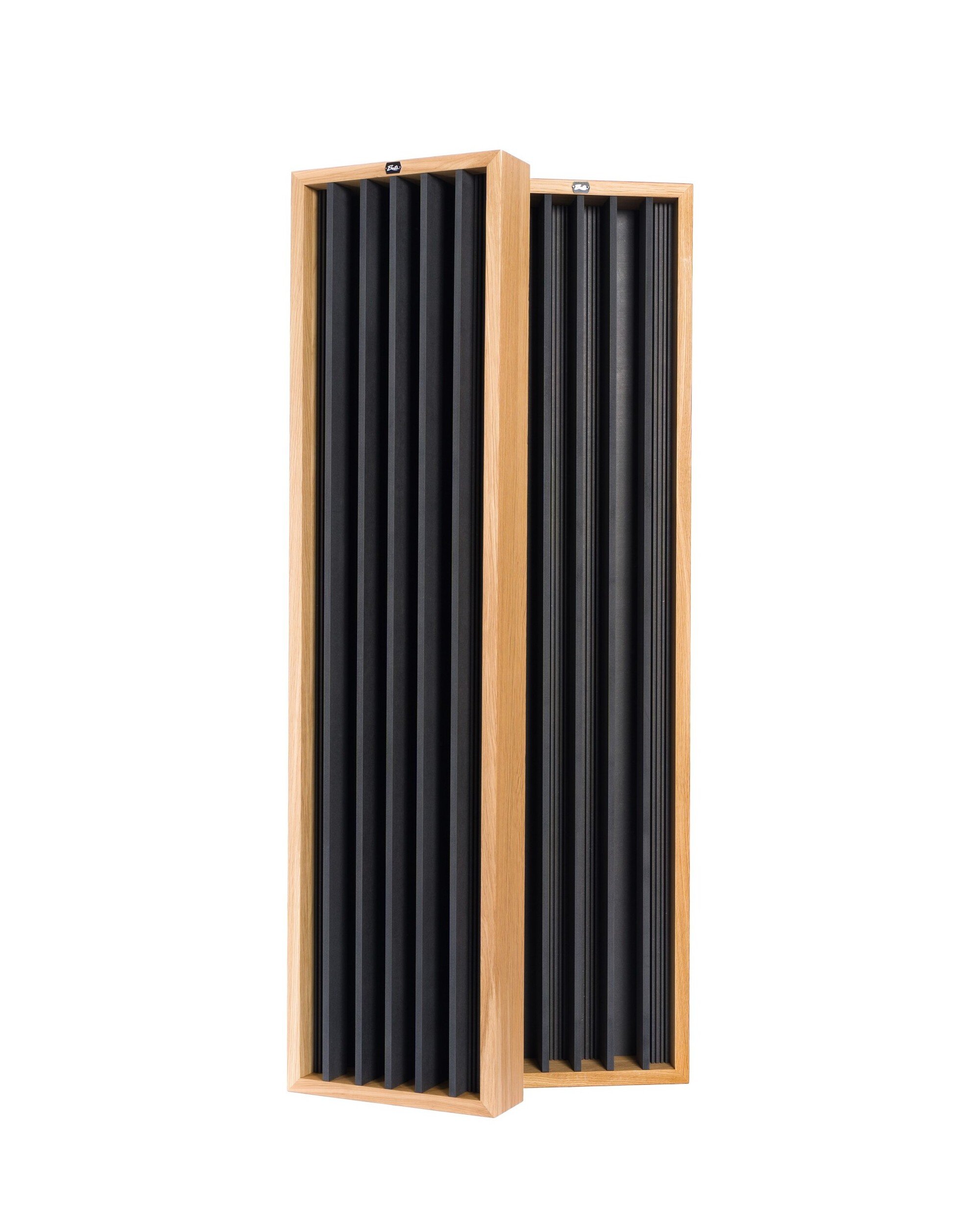

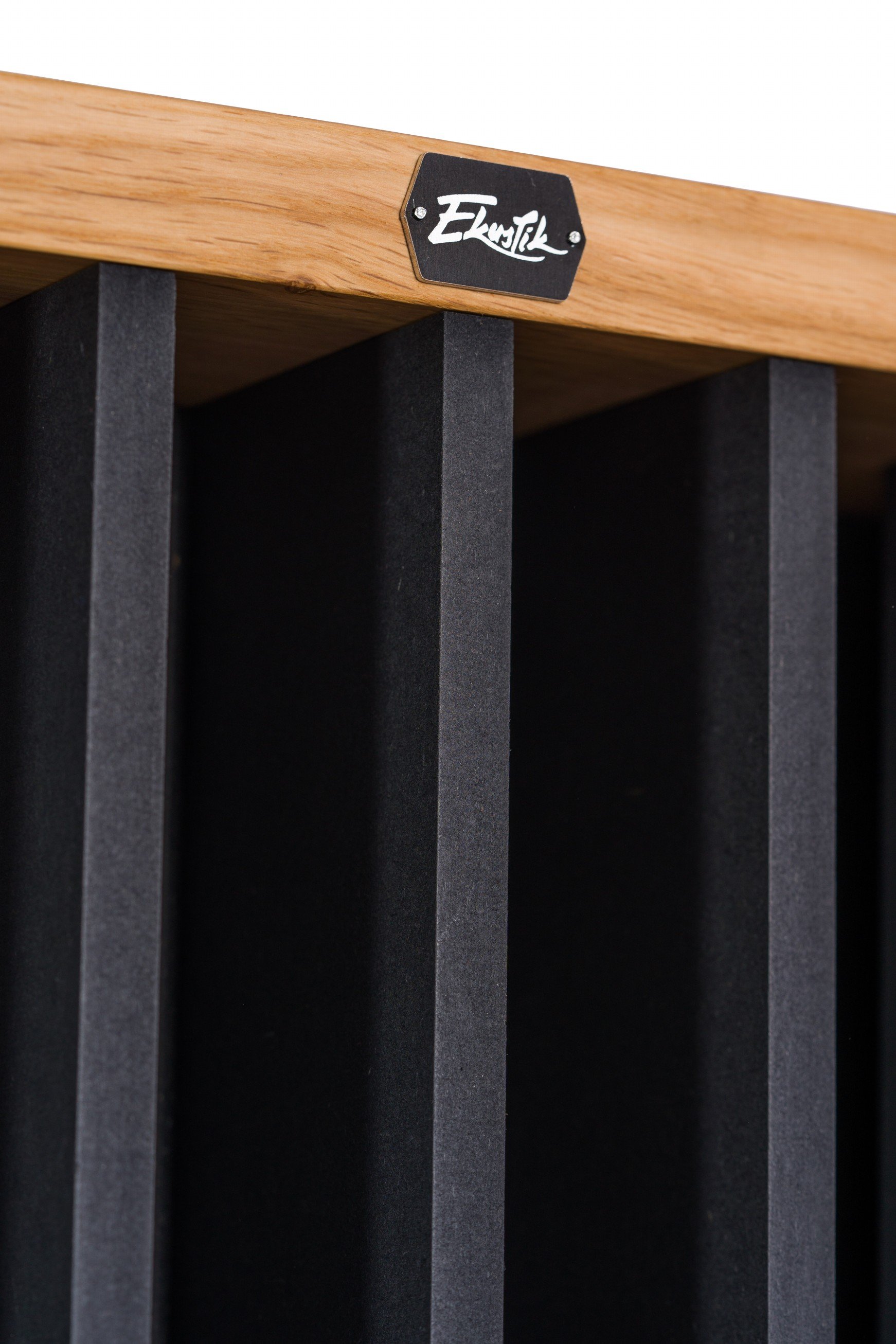
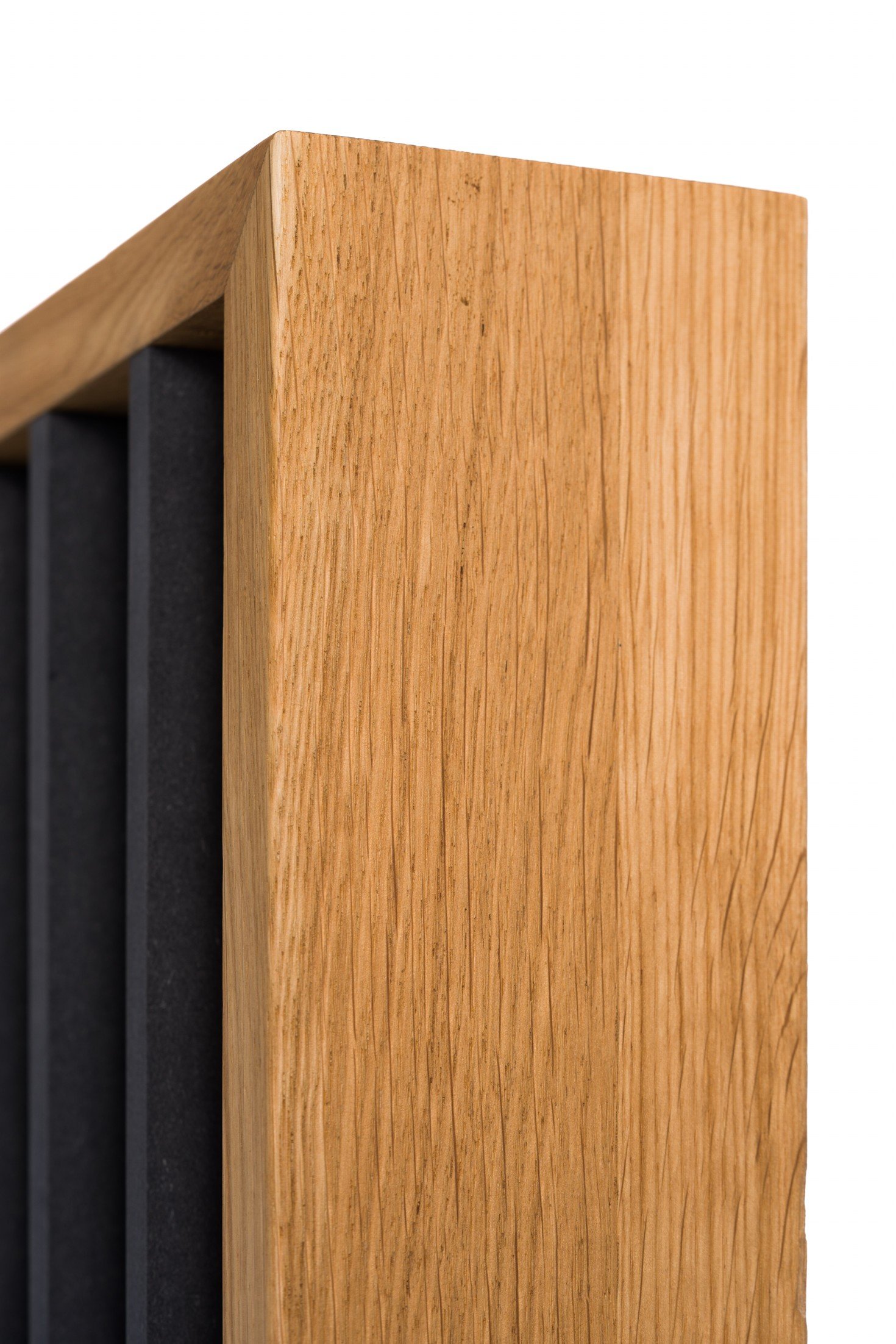
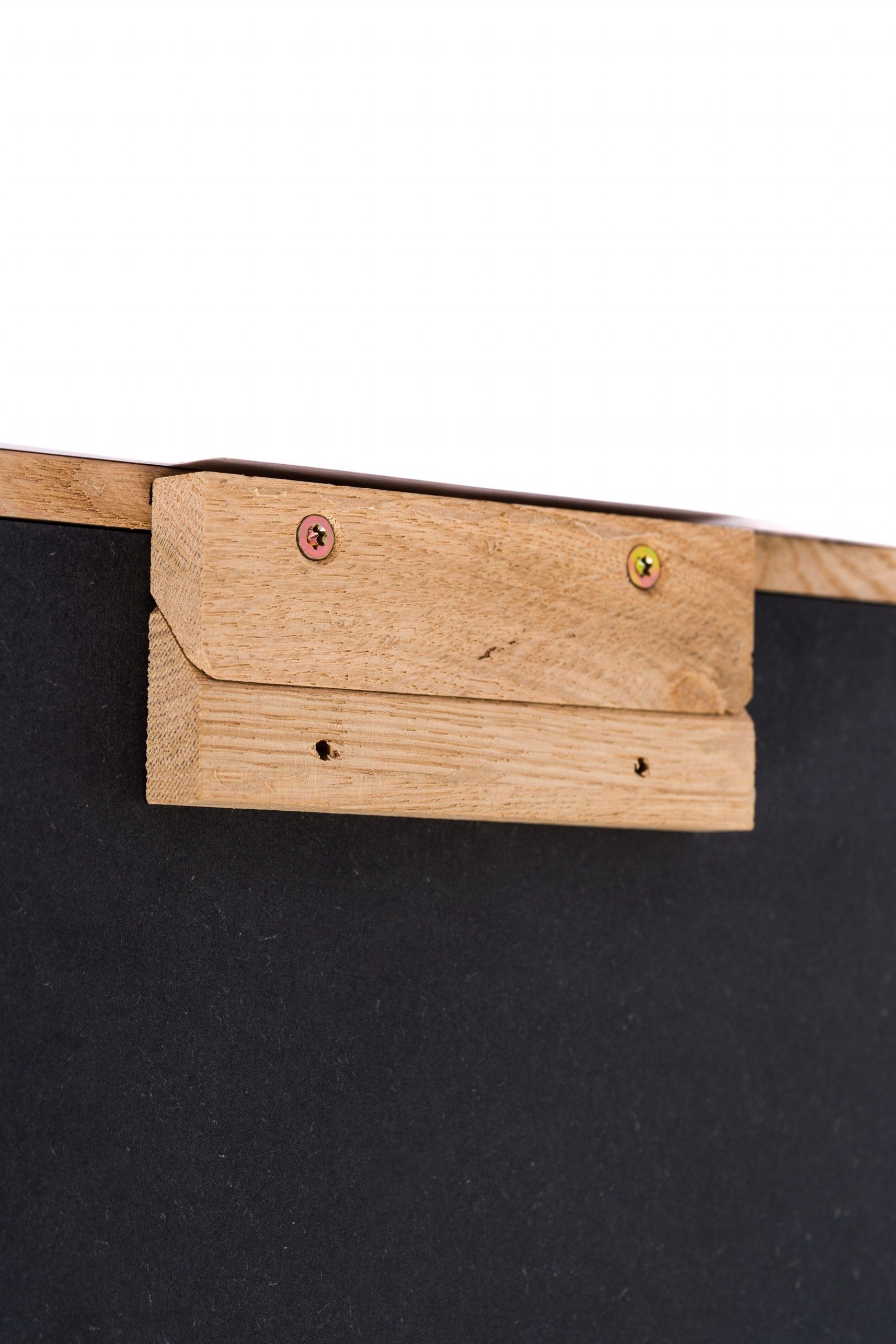
Woody Fractal 34 Diffuser
Premium Quadratic Residue Diffuser (QRD), meticulously engineered for high-end audio and designed to make your space stand out. It offers superior acoustic efficiency while maintaining the leanest profile on the market.
Key features:
Instantly enhances the listening experience by scattering sound and eliminating echoes
Delivers the highest effectiveness starting from 350 Hz, covering crucial mid-to-high frequencies
Features a unique fractal design that extends efficiency well past 4 kHz
At only 10 cm deep, it is the thinnest QRD diffuser available
Handcrafted with a luxurious, patented wooden design
Save 10% when purchasing multiple units
Get inspired by our customers

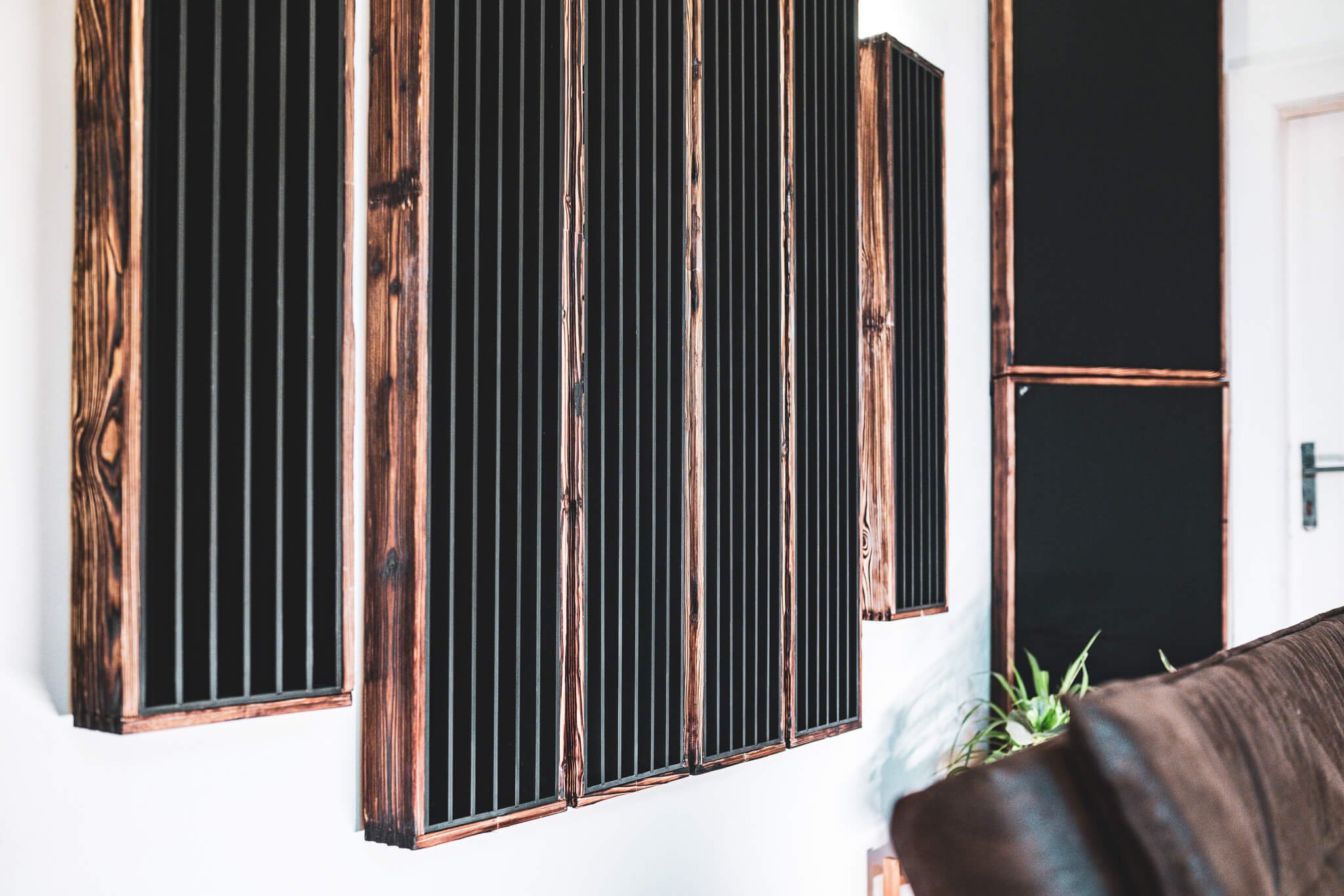
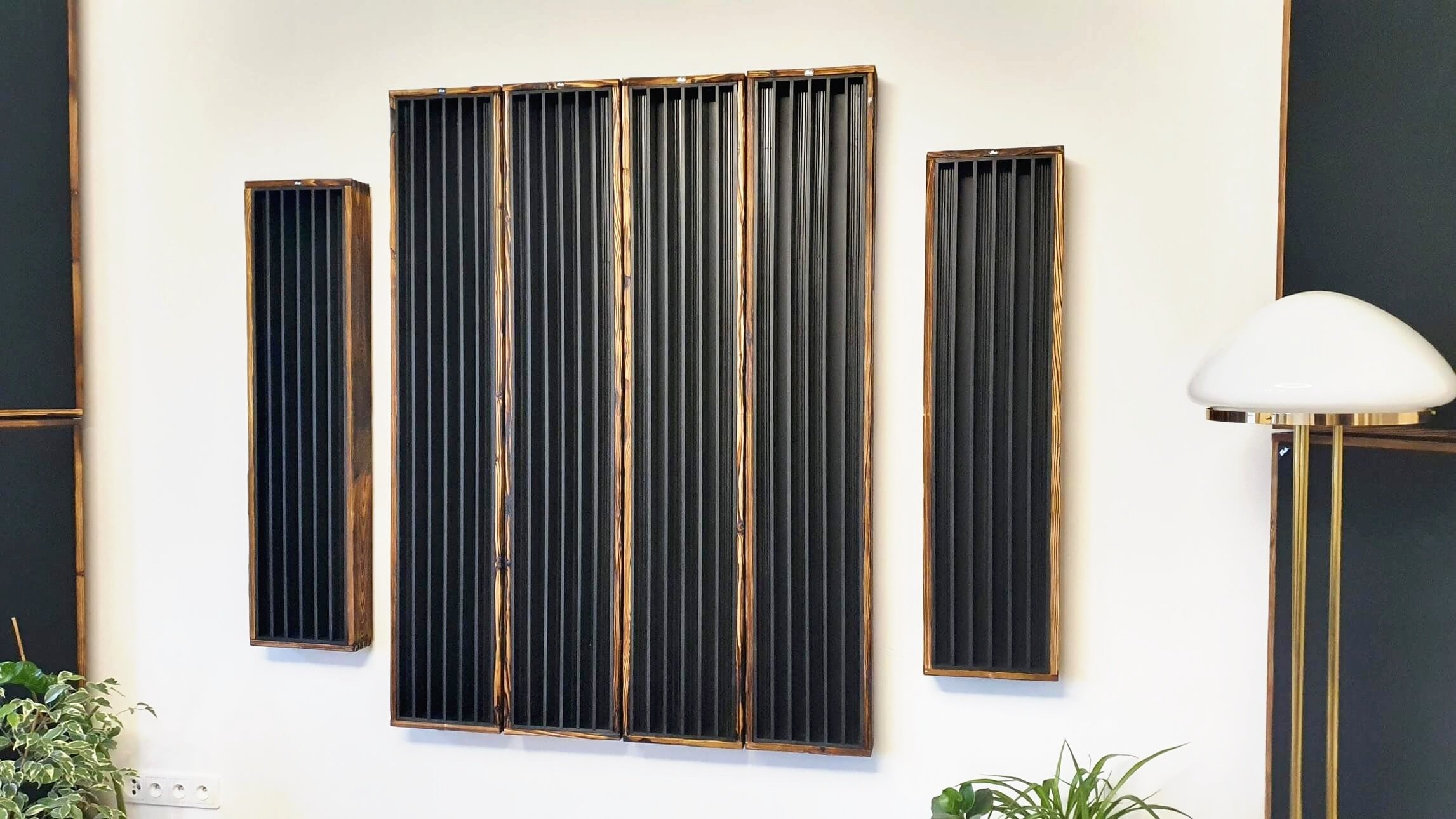
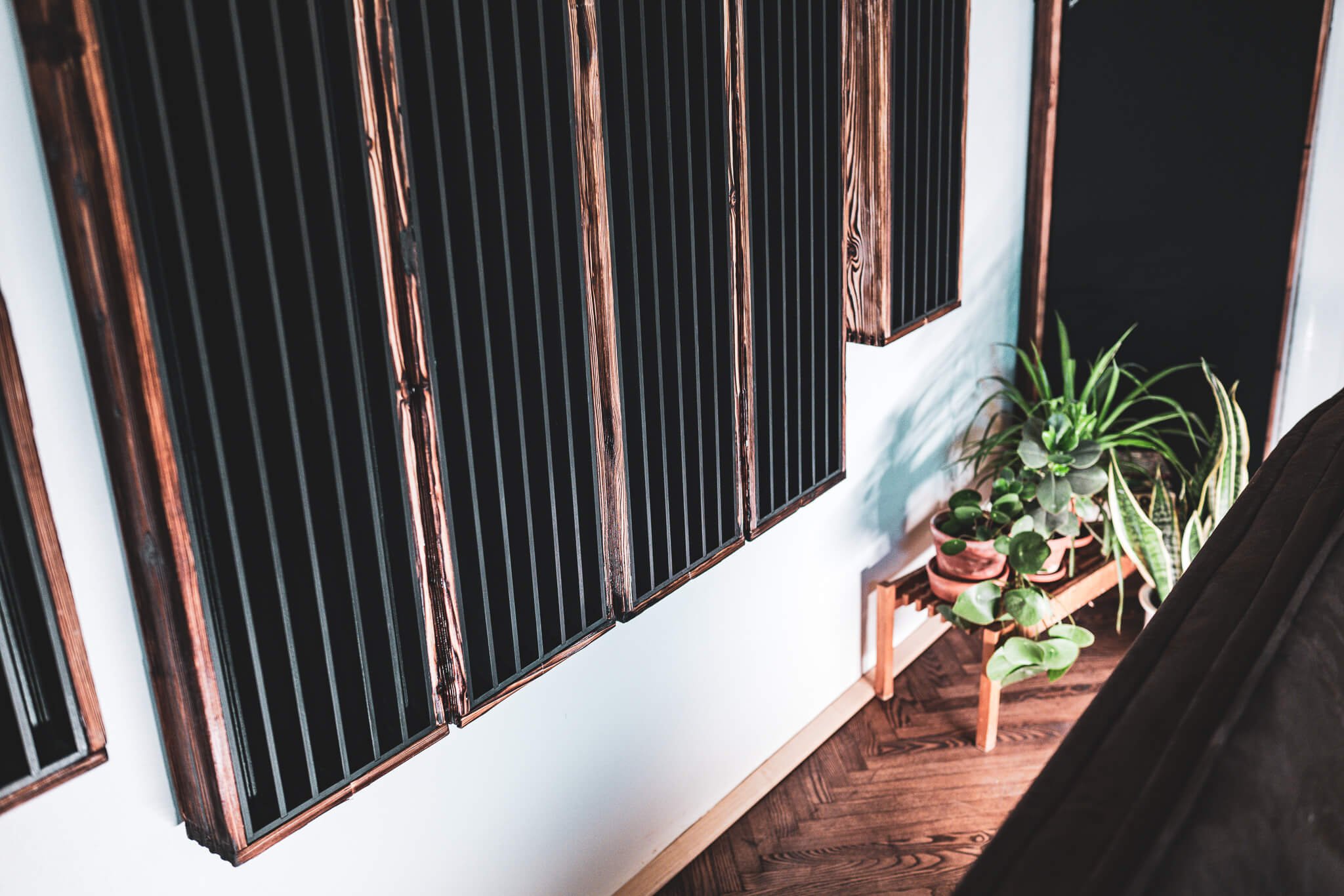
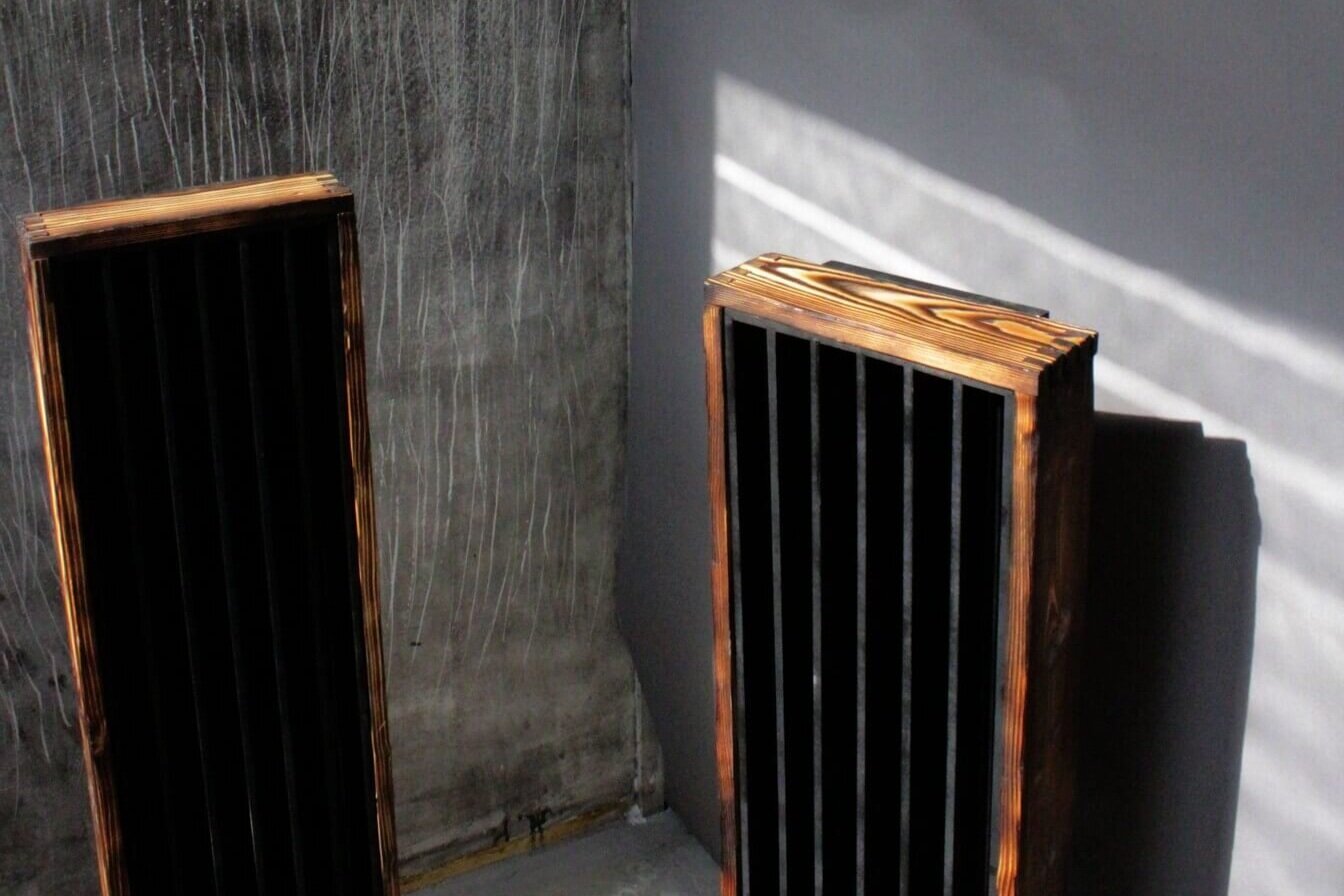
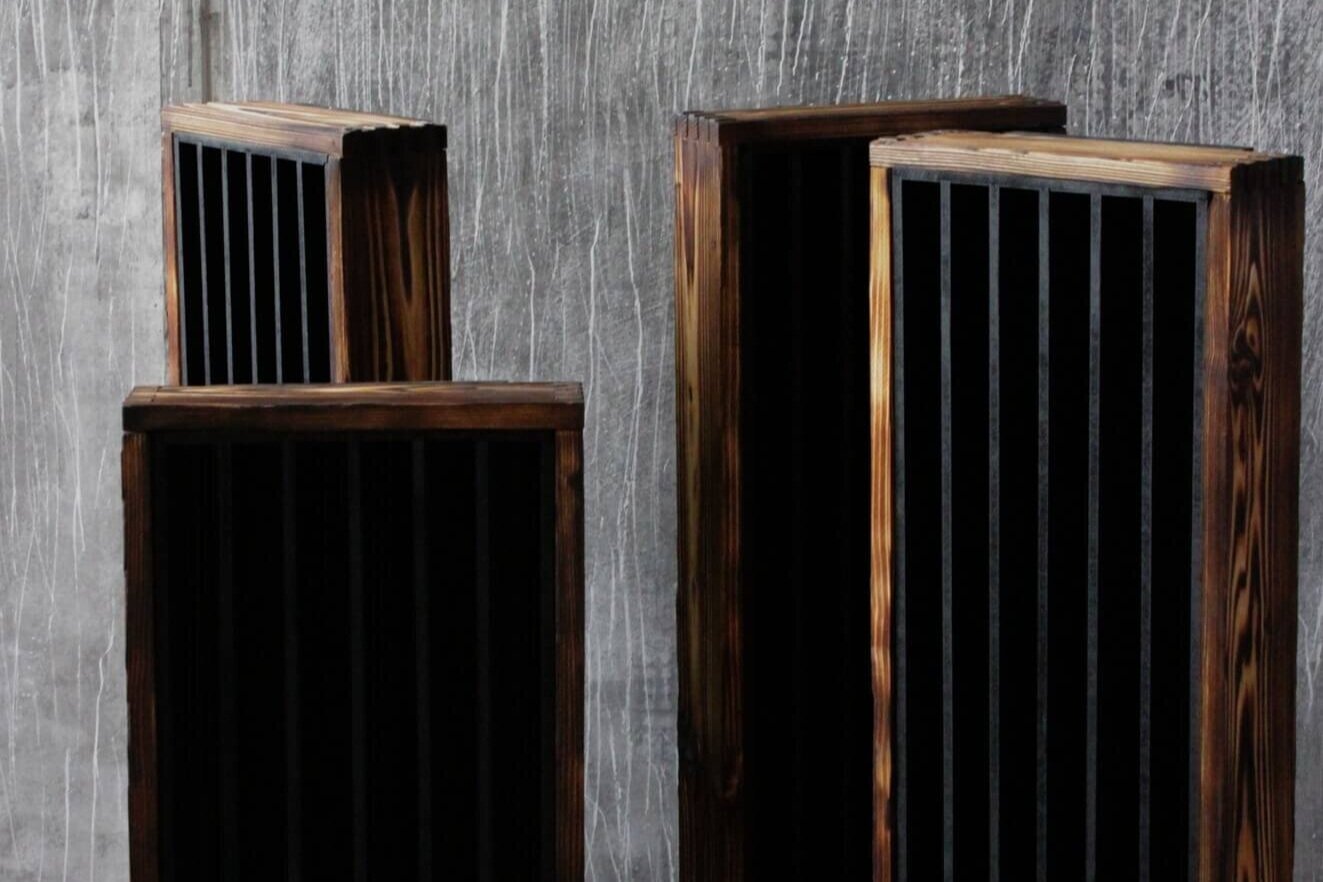
Woody Fractal 34: The Ultimate QRD Diffuser
The Woody Fractal 34 is simply the best-performing small diffuser available. As the only QRD diffuser based on prime n7 with a depth of just 10 cm, it scatters sound waves effectively from 350 Hz and higher. This is a true Schroeder (QRD) diffuser designed to create an evenly distributed, spacious sound field for superior listening in professional music studios and Hi-Fi rooms.
Each Woody Fractal 34 is a handcrafted original made in the Czech Republic and features our signature, patented design.
Unrivaled Technology in a Compact Form
Our Woody Fractal 34 is the thinnest QRD diffuser on the market with comparable performance. This is achieved through two unique design innovations:
Space-Saving Folded Wells: The deepest wells of the panel are intelligently folded, allowing the entire construction to be 4 cm thinner—nearly a third smaller than conventional designs.
Fractal Efficiency: The bottom of each well features a tiny fractal element—essentially another small diffuser nested inside. This innovation significantly boosts the high-frequency scattering efficiency, allowing the diffuser to perform even past 8 kHz.
Packing & Purchasing
The Woody Fractal 34 is only 30 cm wide, so we package them in boxes of two. Since a single piece offers minimal acoustic benefit, you can purchase them in multiples of two. Remember, you need to cover a sufficient area of the wall to achieve evenly diffused sound.
Recommended Placement
Behind the Listening Position: For the best possible listening experience, use an array of four or more diffusers on the rear wall. The larger the array, the better the sound is diffused to your ears.
Front or Side Walls: Suited primarily for Hifi use, place at least two diffusers right next to each other on the front wall (straight behind the speakers) or on the side walls at your first reflection points.
“34 mm is the width of the wells - the main parameter to ensure the effectiveness of the diffuser”
How to use the Woody Fractal 34
The Woody Fractal 34 is an essential tool for high-end acoustic treatment. Its purpose is the exact opposite of an absorber: it's designed to keep sound energy in the room by evenly scattering sound waves.
Effectively Scattering Sound Waves
Acoustic diffusers are the "holy grail" of acoustic treatment. While any rugged surface (like a stone wall) can randomly scatter sound, a true diffuser is different. It is a scientifically designed device that uses a physics-based formula to evenly distribute sound reflections. This uniform scattering creates a consistent diffuse field that is predictable, making your music sound spacious, lively, and engaging at your listening position.
Optimal Placement Strategy
To maximize the benefits of diffusion, proper placement is critical:
Primary Placement (Rear Wall): You should place the diffusers 2 to 3 meters behind your listening position. This distance gives the sound waves adequate space to scatter and create the desired even diffuse field fully. Ideally, aim for a diffusion wall that is at least 2 meters wide. If you have a larger room, increase the width of the diffusion array.
Secondary Placement (Side and Front Walls): After treating the rear wall, you can place diffusers on the side walls or the front wall.
Sidewalls: Placing diffusers on your first reflection points prevents direct sound reflections from flat walls. This maintains the liveliness of the music in your room without allowing destructive early reflections.
Front Wall: This is suitable if you want to keep more high-frequency energy in the room while eliminating unwanted reflections. You can substitute absorption panels on the front wall with a quality diffuser to maintain energy and spatial depth.
Left: sound wave reflected from the bare wall. Middle: sound wave absorbed by the acoustic absorber placed on the wall. Right: sound waves scattered in various directions after bouncing off the diffusor.
The science behind “N7 fractal QRD with folded well”
The Woody Fractal 34 is built on four distinct acoustic innovations to deliver market-leading performance in the smallest possible footprint.
Quadratic Residue Diffuser (QRD)
The Woody Fractal 34 is a QRD (Quadratic Residue Diffuser) based on the original work of physicist Manfred Schroeder in the 1970s. This technology remains the golden standard in acoustics, and we consider it the only "true diffusion" due to its proven, predictable efficiency rooted in number theory.
The working frequency range of any QRD is determined by its physical dimensions:
The depth of the wells defines the lowest working frequency.
The width of the fins defines the upper-frequency limit.
Prime N7 Design
Our diffuser is built upon a Prime Number N7, which dictates the layout of the wells. This means the design features seven total wells, with one having zero depth. You can see six of these narrow holes, while the seventh is naturally formed by the two sidewalls of the entire panel.
The Folded Well Advantage
The deepest well in the design is 13.6 cm, which mathematically establishes the start of the effective working range at approximately 350 Hz.
But how is this possible with a panel depth of just 10 cm?
We folded the deepest well in half to maximize the acoustic depth while minimizing the physical bulk. This clever spatial trick allows the panel to be 4 cm thinner than a conventional QRD, maintaining its high effectiveness without wasting precious space in your room.
Fractal Technology for Extended Range
The final key to the Woody Fractal 34's superior performance is its unique fractal design.
The primary well width of 34 mm would typically limit the effective scattering range to about 4 kHz. We extend this efficiency by integrating a fractal pattern:
A fractal is a never-ending, self-similar pattern. In our case, it is a tiny, secondary diffuser seamlessly integrated into the bottom of the main wells. This miniature diffuser—with a 5 mm maximum well depth—captures and scatters even the highest frequencies. This exclusive masterpiece boosts the panel's effectiveness past 8 kHz, a performance benchmark you will only find in the highest-end acoustic production.
Detail of the fractal design in the bottom of the well.
PROPERTIES
100% Czech handmade product with a quality guarantee
Practical working range: from 350 Hz, past 8k Hz
Dimensions 30 x 120 x 10 cm (width x height x depth)
Luxury wood finish
Wall hang system included
The package consists of 2 diffusers
Weight approx 20 kg (2 x 10 kg)
Design can be customized
Interior use only
FAQ
What is the difference between an absorber and a diffuser?
Absorbers take in sound energy and convert it to heat, which reduces reflections. Diffusers are more clever: they evenly distribute sound waves by scattering them from an irregular surface. This maintains the sound energy in the room, making music feel more spacious and lively.
Do all diffusers work the same way?
No. Only mathematically calculated diffusers, like our Woody Fractal, have a predictable working range and are designed to target specific frequencies. A simple rugged wall creates only random, non-uniform scattering. This precision is why QRD diffusers are the standard in professional spaces.
How many diffusers do I need in my room?
Diffusers must be placed in a large array—at least a few meters wide—to make a difference. For the best result and the most evenly diffused field, we recommend a minimum of five or more diffusers lined up next to each other. If your array is less than one meter wide, you likely won't hear a significant difference.
Where should I place diffusers?
Rear Wall: The most popular spot in studios and listening rooms. If your listening position is at least 2 meters from the rear wall, the diffusers have enough space to distribute the sound evenly, giving you the best experience.
Side Walls: Use them on your first reflection points instead of only absorbers. This preserves more liveliness while ensuring unwanted energy is scattered, not reflected directly at you.
Front Wall: Suitable for audiophiles. Placing arrays on two opposite walls can create an effect of 'endless space' by ensuring sound energy is never reflected by a flat surface.
How is the effectiveness of the diffusion measured?
It's very difficult to test diffusion physically, which is why almost no one does it. We rely on the established science: QRDs are designed using mathematical formulas based on number theory developed in the 1970s. We use special modeling software to test and verify all our designs before production.
Can you make a panel on request?
Yes, custom work is what we enjoy most. Ekustik diffusers and absorbers are built to last a lifetime, so we encourage you to outfit your room with perfect designer pieces.


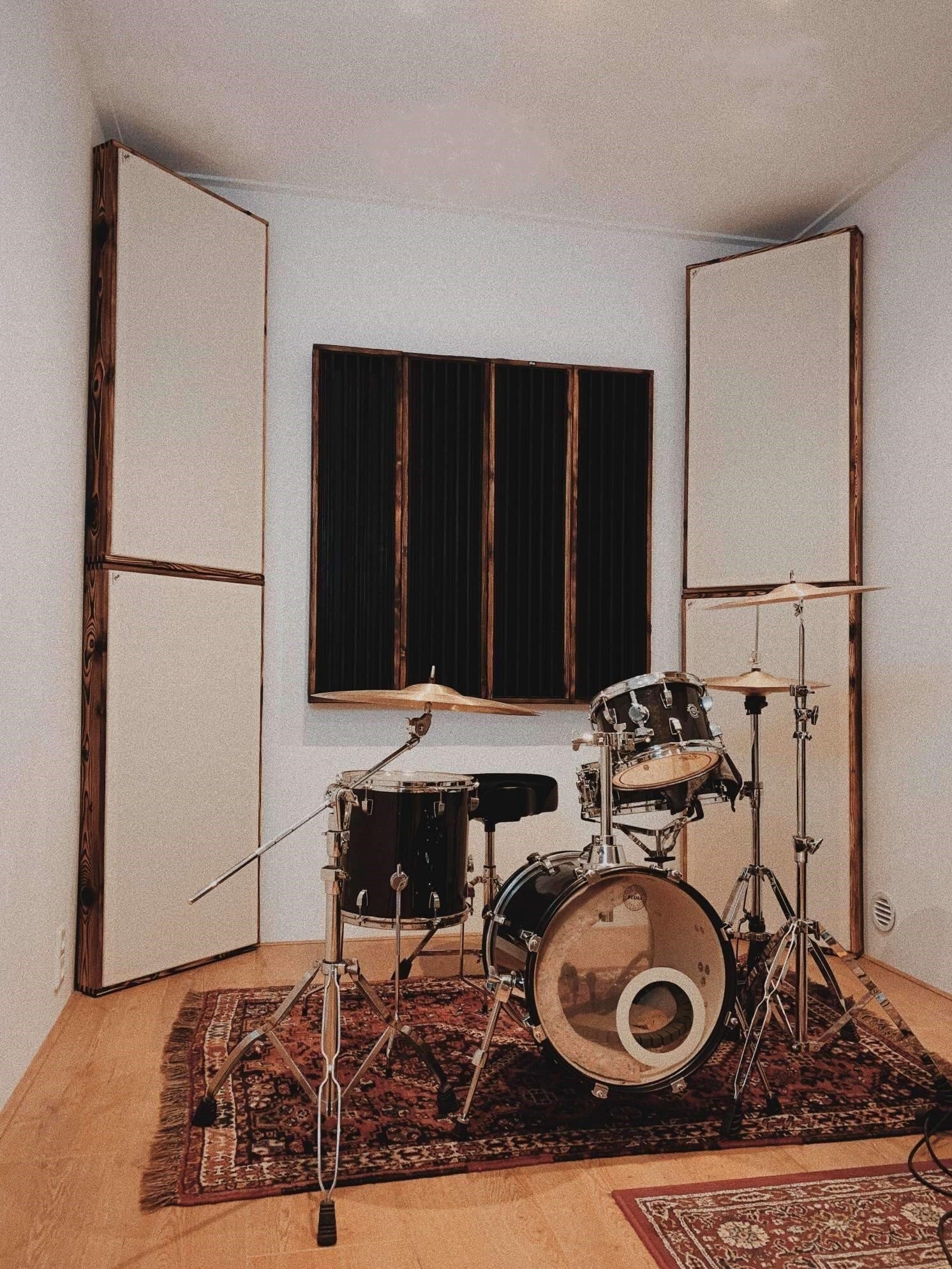

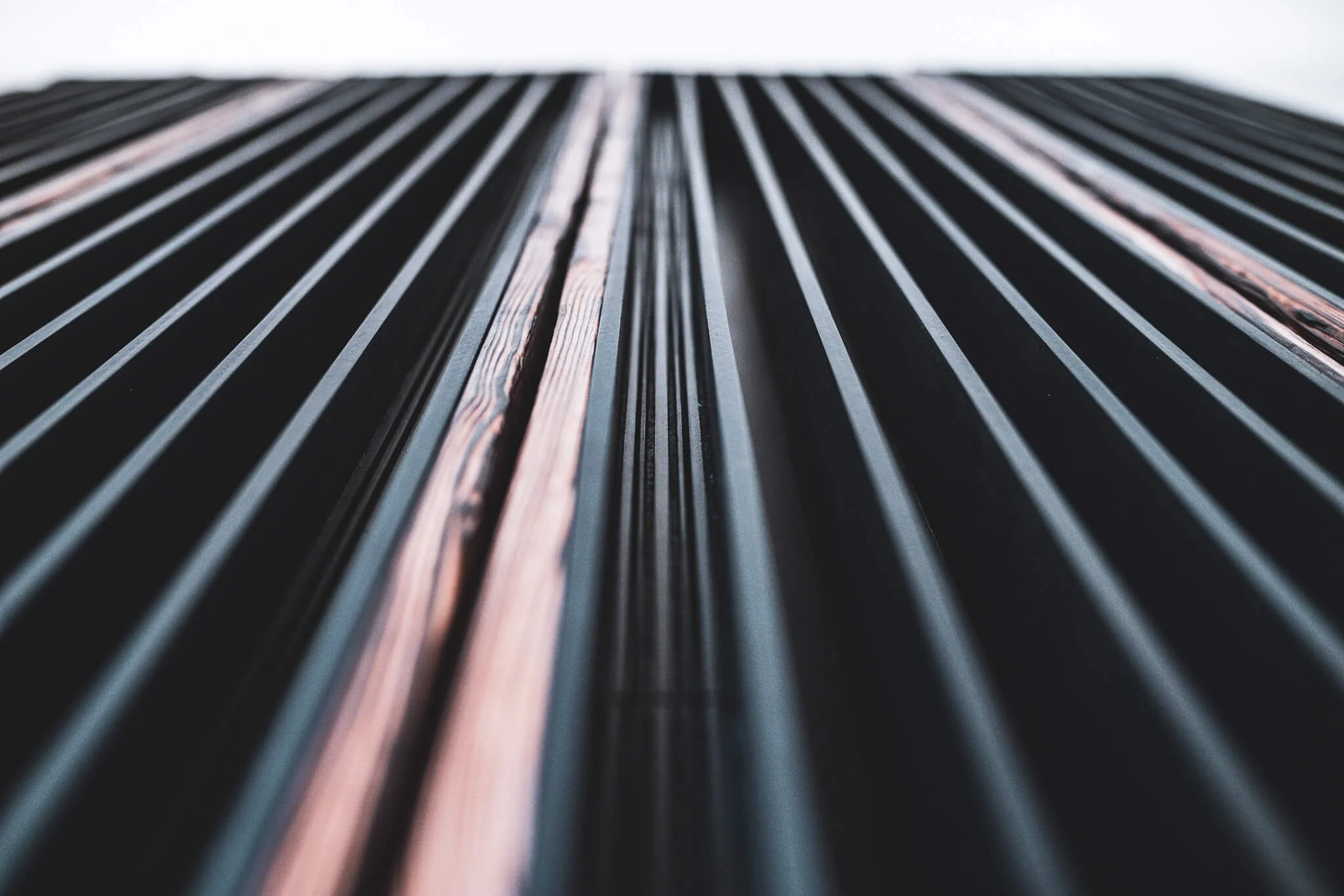








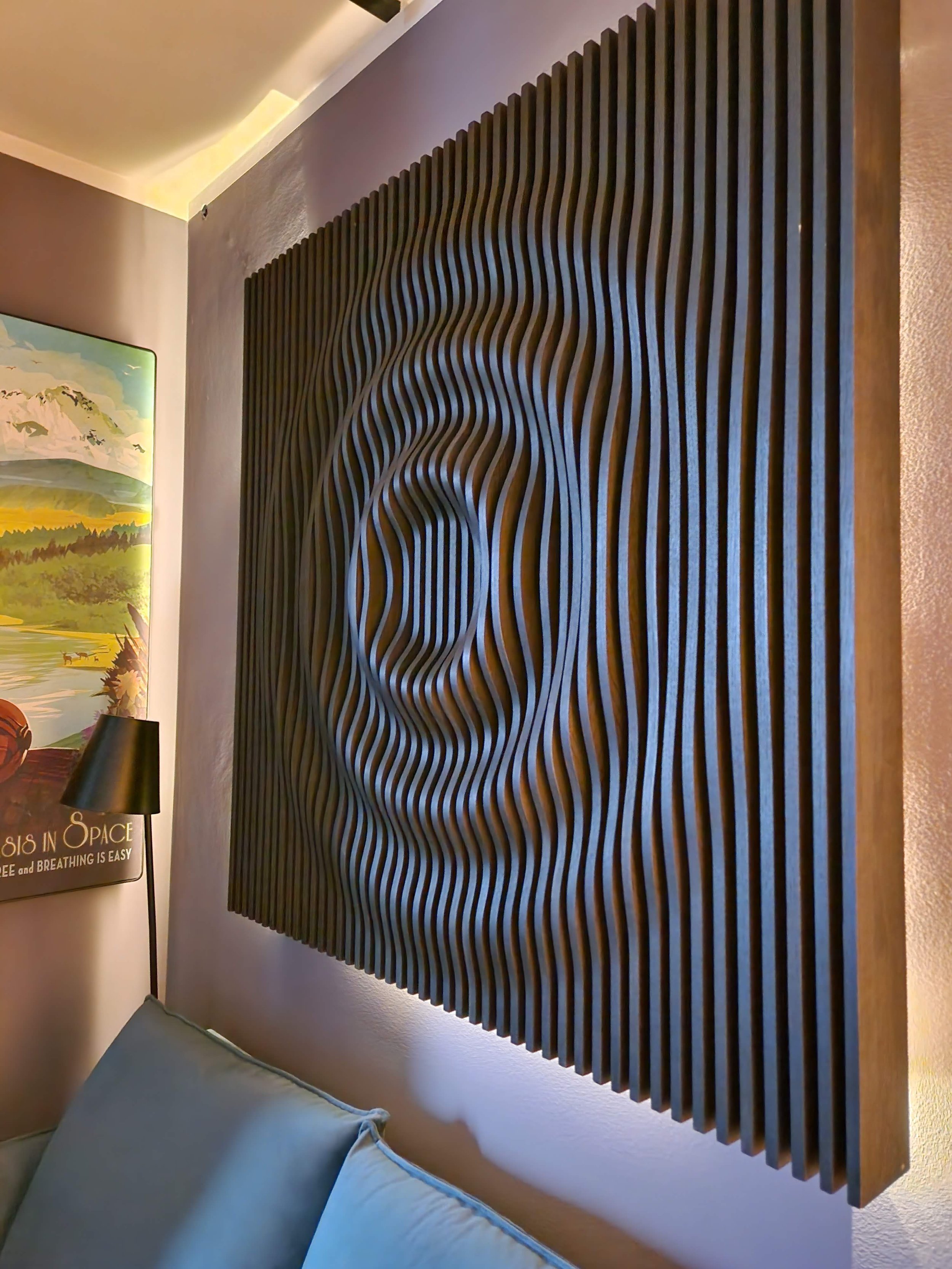

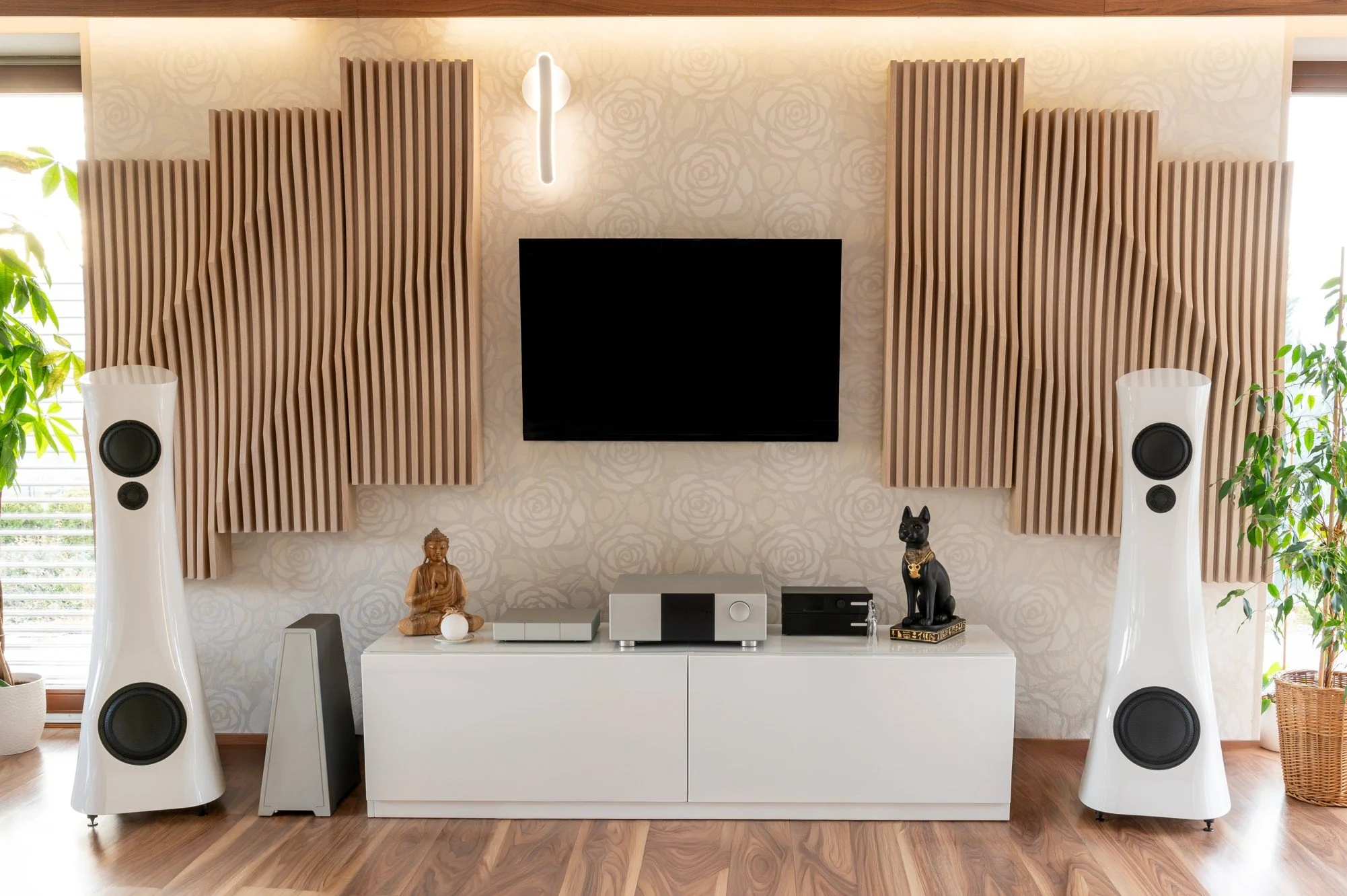





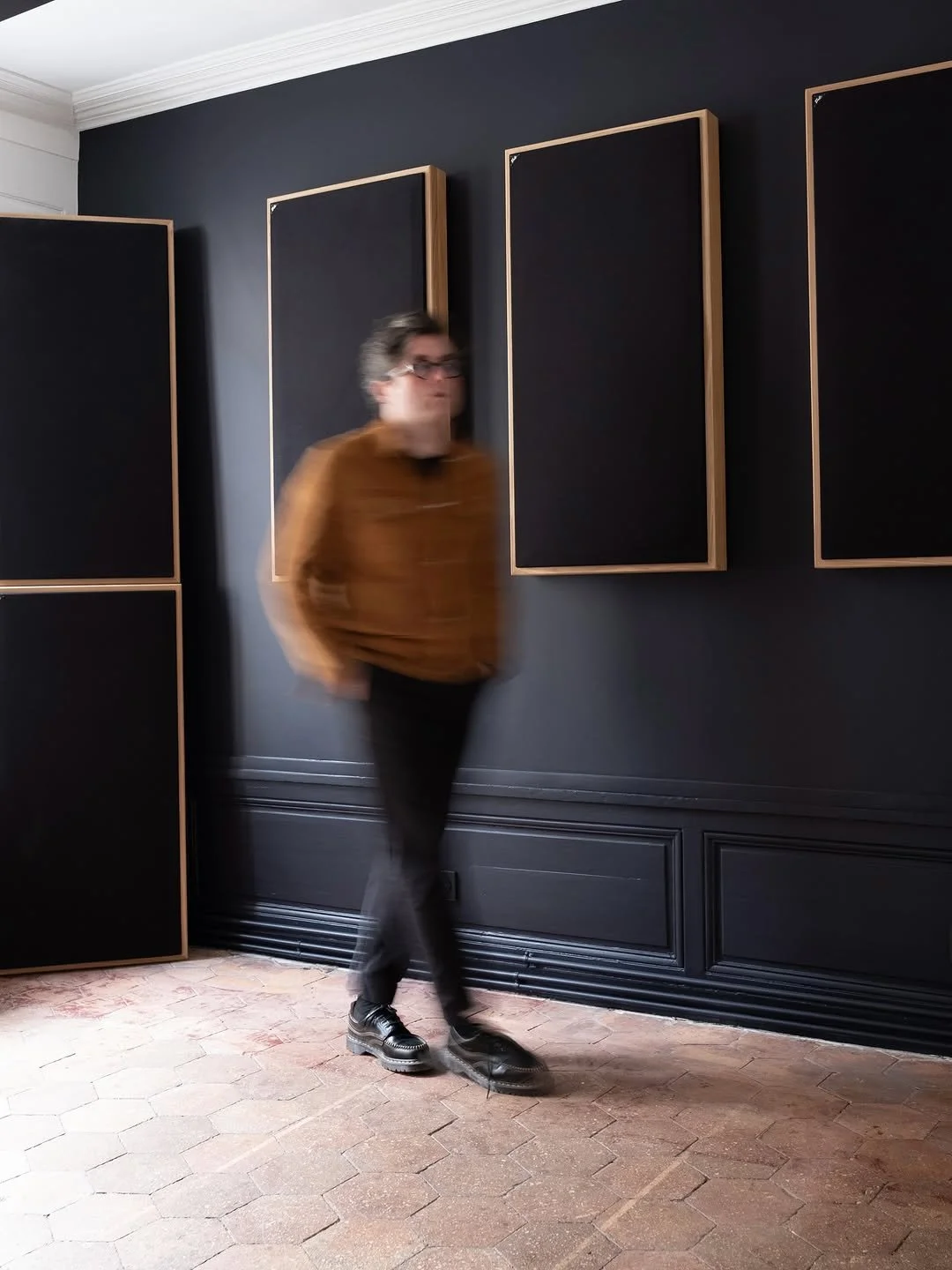
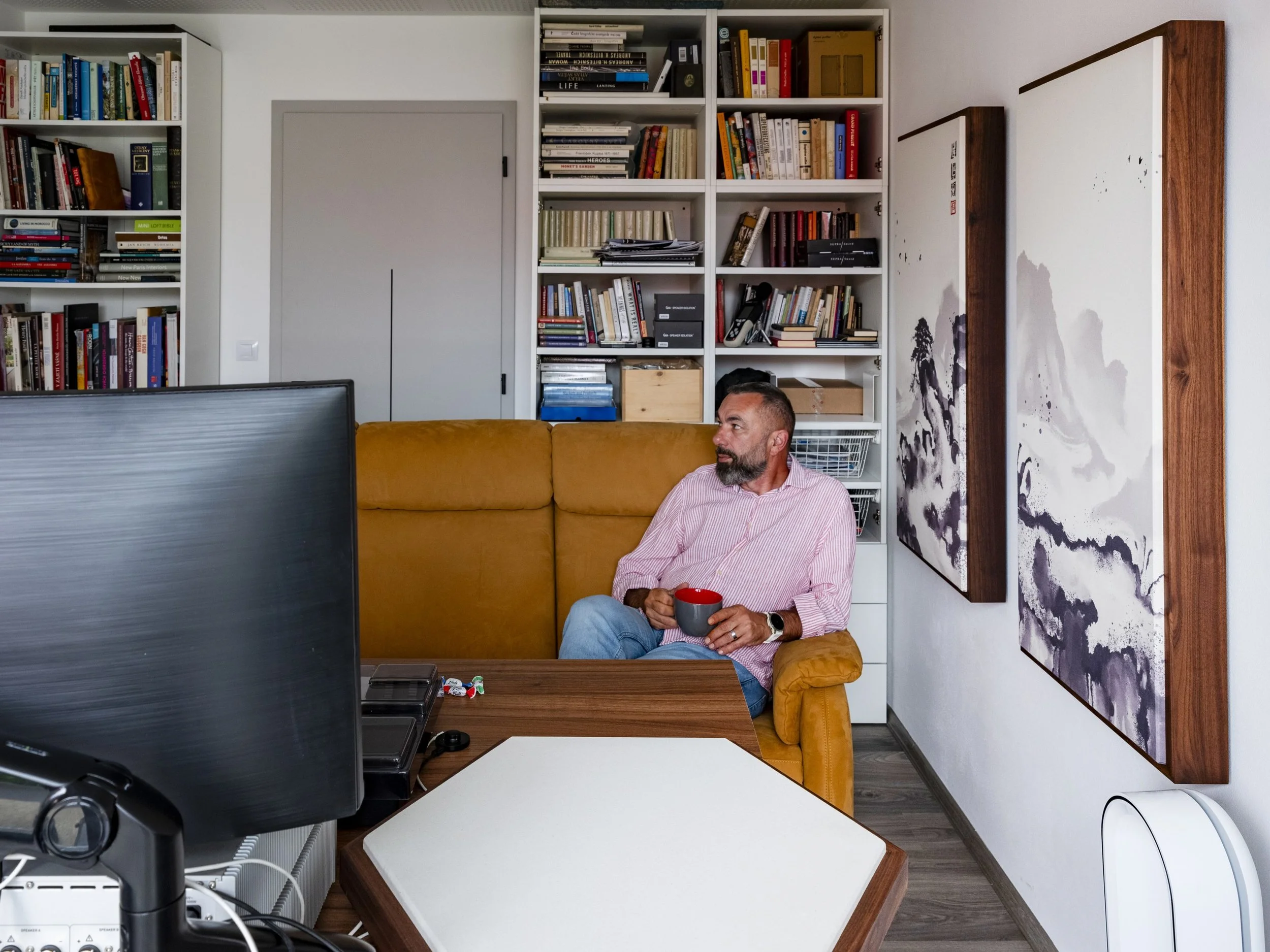




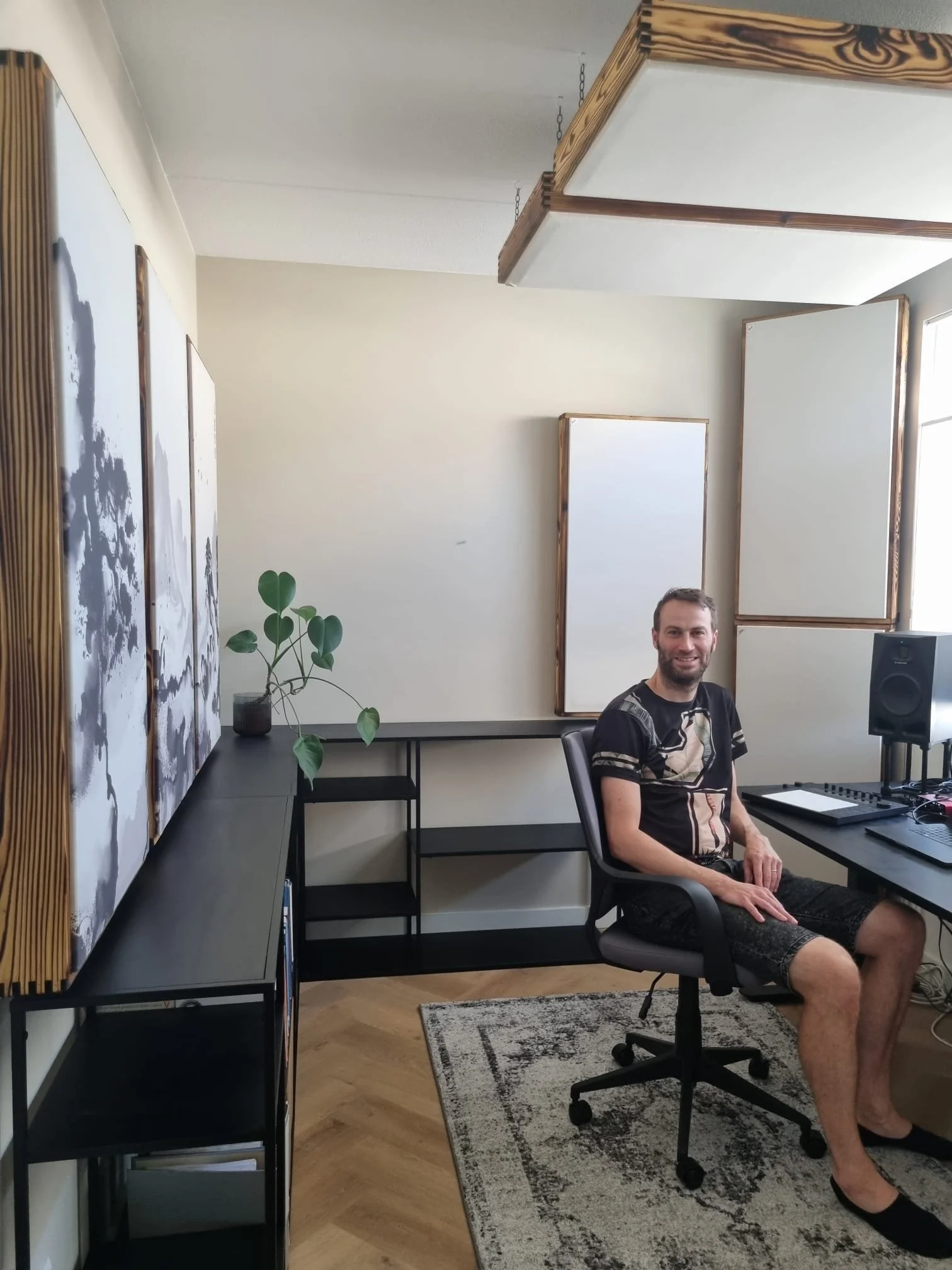








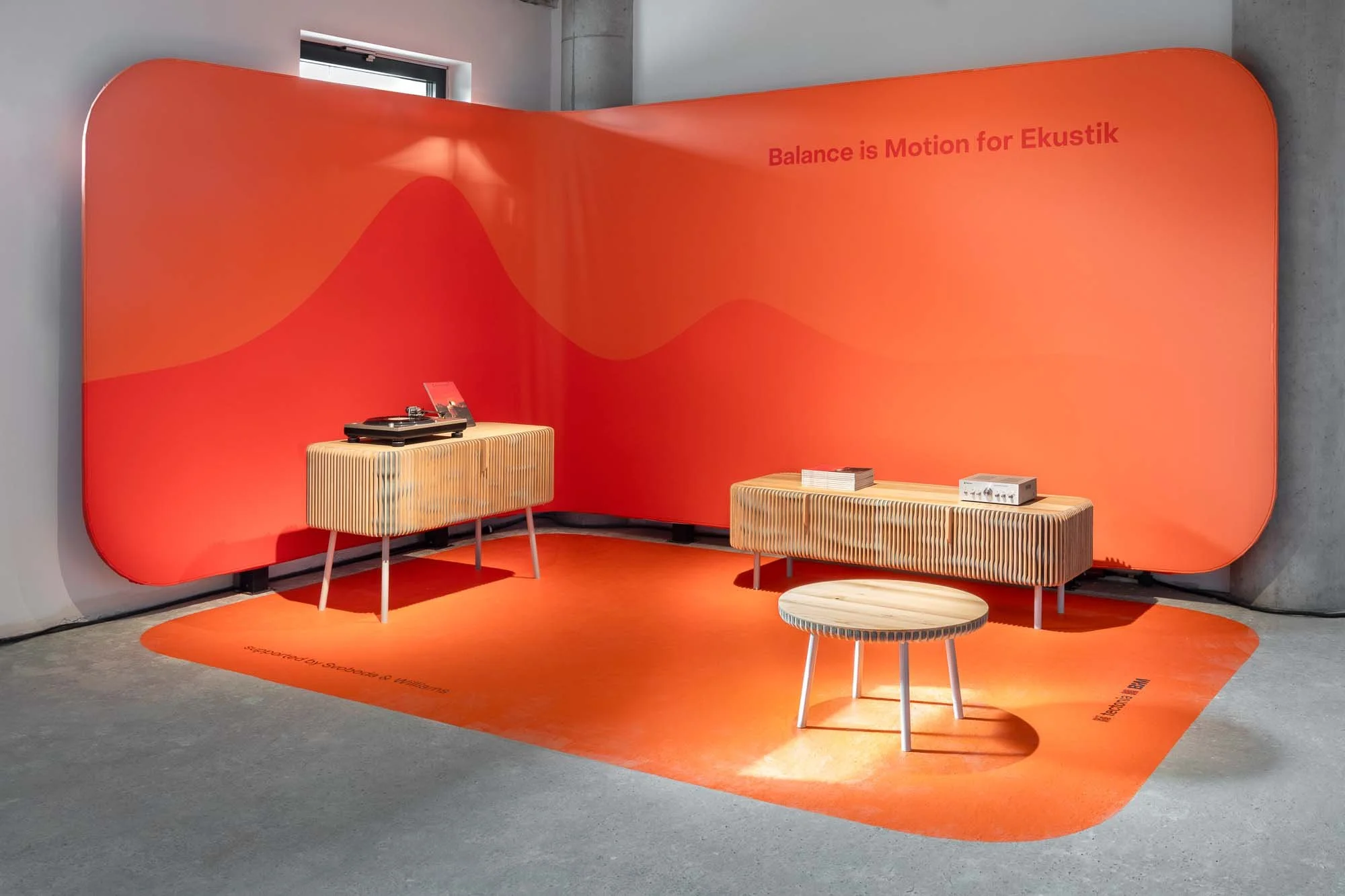
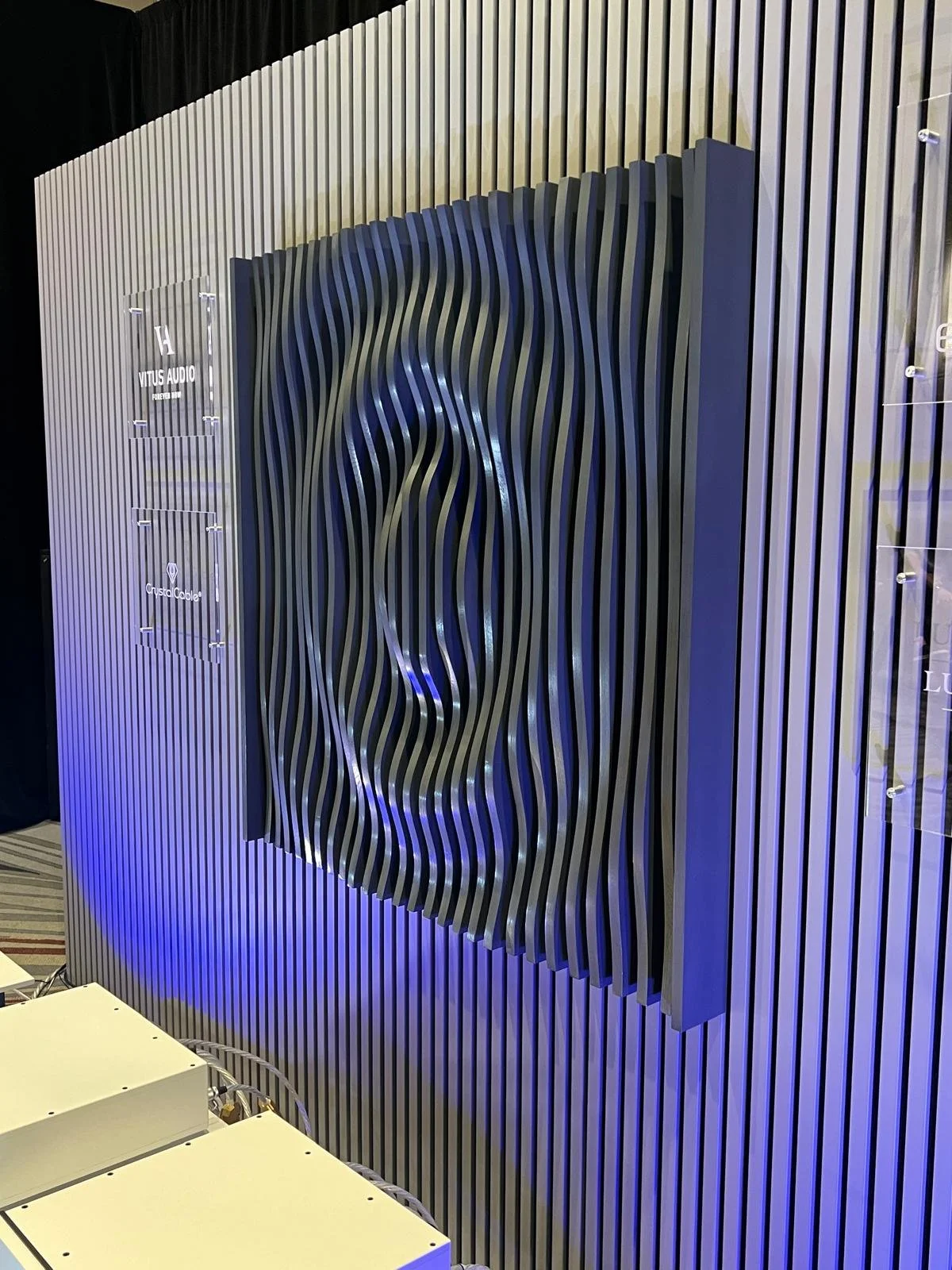





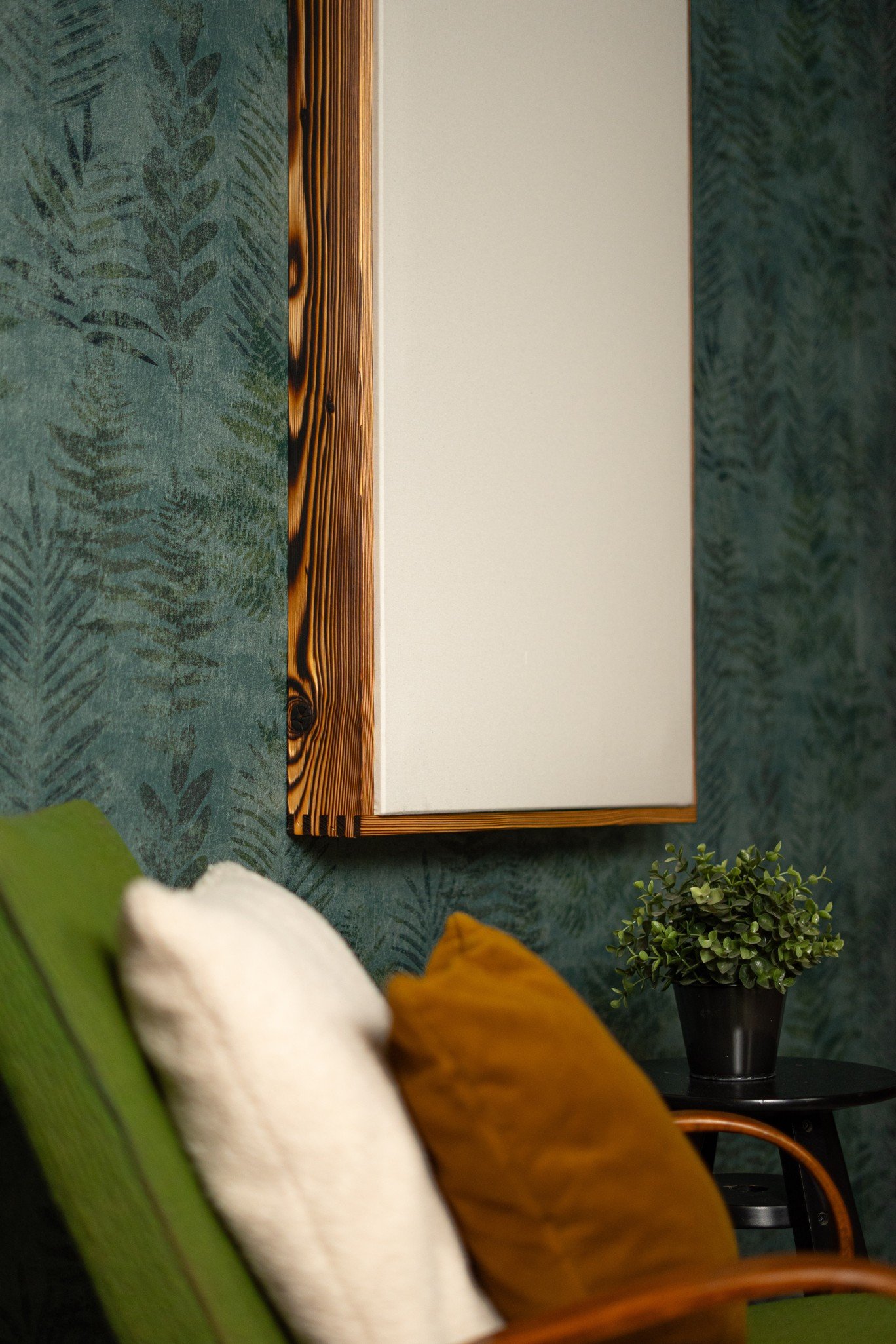




Enhance your space with the ultimate 2D QRD acoustic diffusion. The Woody Omni Diffuser is engineered for unparalleled performance, scattering sound waves uniformly in many directions. Elevate both your sound and your style with diffusers proudly handmade in the Czech Republic.
Key features:
Instantly boosts sound quality and prevents distracting flutter echoes
The design uniformly scatters sound waves, preserving energy and making your room sound spacious
A minimal 10 cm depth allows the diffuser to fit effectively anywhere
Features a premium wooden finish
Save 10% when you buy in bulk